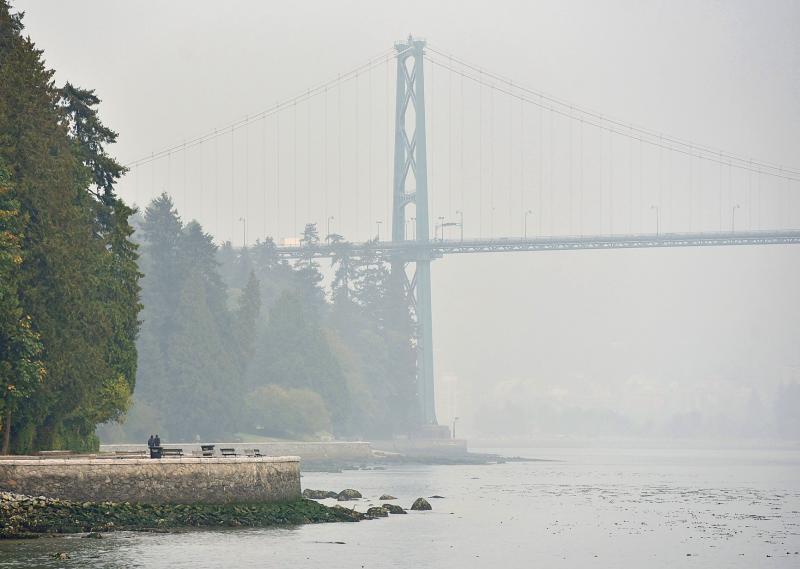Smoke from California and Oregon wildfires this week cloaked Canada’s third-largest city of Vancouver — known for its majestic mountain views and fresh ocean breezes — in the dirtiest air in the world.
Days have been spent smarting under a thick haze that has irritated eyes and throats, and sent asthmatics gasping for breath. It has also complicated COVID-19 testing.
On Friday, despite forecasted smoke-clearing rain storms, the city — 1,300km north of the biggest California fires — topped for the second time this week the World Air Quality Index for worst air, after briefly ceding first place to Portland in fire-stricken Oregon.

Photo: AFP
“I’m out of breath all the time, my chest feels like it’s exploding, I feel like I’m going to suffocate,” said Fatima Jaffer, a doctoral student at the University of British Columbia.
“I’m afraid of the long-term damage this smoke might do to my lungs and my asthma,” she added.
Authorities for the metropolitan region of 2.5 million residents have issued daily air quality warnings since Tuesday last week, with things so bad that Vancouver opened five filtered “clean air shelters.”
It is equivalent to smoking eight cigarettes a day, researchers said.
Health officials urged people to close windows and avoid strenuous exercise or outdoor activities — especially those with respiratory illness.
Jaffer, 58, said her worsening asthma added to a sense of panic and dread, as she had just recovered from COVID-19, which robbed her of her sense of smell.
She worries the smog could increase her odds of reinfection or cause new health complications.
“I’d just gotten to the place of getting over the fear of COVID-19 and felt like I could breathe again, and now I literally can’t,” she said.
It has been an “entire horrible week for air quality,” said Armel Castellan, a federal warning preparedness meteorologist. “The fine particulate has brought our Air Quality Health Index up off the charts.”
“There’s no doubt this is very massive and very concerning,” he said.
The same people are at most risk of smoke inhalation and the coronavirus, said Bonnie Henry, British Columbia’s provincial health officer.
The past month has seen British Columbia’s active COVID-19 cases surge 130 percent, hitting highs more than double those at the pandemic’s April peak.
“For many of us, there’s confusion about what symptoms are caused by smoky skies, and what symptoms are caused by COVID-19,” Henry told a news conference, “particularly for people who have underlying lung disease, asthma, heart disease and diabetes.”
Another vulnerable group is Vancouver’s more than 2,000 homeless residents, many of whom have chronic illness, a survey showed.
“If you’re outside and homeless, and surrounded by this smoke and the pandemic, you can’t get away from any of these things,” Union Gospel Mission communications manager Jeremy Hunka said. “It’s hitting a group of people that generally have been just left far more vulnerable.”

Auschwitz survivor Eva Schloss, the stepsister of teenage diarist Anne Frank and a tireless educator about the horrors of the Holocaust, has died. She was 96. The Anne Frank Trust UK, of which Schloss was honorary president, said she died on Saturday in London, where she lived. Britain’s King Charles III said he was “privileged and proud” to have known Schloss, who cofounded the charitable trust to help young people challenge prejudice. “The horrors that she endured as a young woman are impossible to comprehend and yet she devoted the rest of her life to overcoming hatred and prejudice, promoting kindness, courage, understanding

US President Donald Trump on Friday said Washington was “locked and loaded” to respond if Iran killed protesters, prompting Tehran to warn that intervention would destabilize the region. Protesters and security forces on Thursday clashed in several Iranian cities, with six people reported killed, the first deaths since the unrest escalated. Shopkeepers in Tehran on Sunday last week went on strike over high prices and economic stagnation, actions that have since spread into a protest movement that has swept into other parts of the country. If Iran “violently kills peaceful protesters, which is their custom, the United States of America will come to

‘DISRESPECTFUL’: Katie Miller, the wife of Trump’s most influential adviser, drew ire by posting an image of Greenland in the colors of the US flag, captioning it ‘SOON’ US President Donald Trump on Sunday doubled down on his claim that Greenland should become part of the US, despite calls by the Danish prime minister to stop “threatening” the territory. Washington’s military intervention in Venezuela has reignited fears for Greenland, which Trump has repeatedly said he wants to annex, given its strategic location in the arctic. While aboard Air Force One en route to Washington, Trump reiterated the goal. “We need Greenland from the standpoint of national security, and Denmark is not going to be able to do it,” he said in response to a reporter’s question. “We’ll worry about Greenland in

PERILOUS JOURNEY: Over just a matter of days last month, about 1,600 Afghans who were at risk of perishing due to the cold weather were rescued in the mountains Habibullah set off from his home in western Afghanistan determined to find work in Iran, only for the 15-year-old to freeze to death while walking across the mountainous frontier. “He was forced to go, to bring food for the family,” his mother, Mah Jan, said at her mud home in Ghunjan village. “We have no food to eat, we have no clothes to wear. The house in which I live has no electricity, no water. I have no proper window, nothing to burn for heating,” she added, clutching a photograph of her son. Habibullah was one of at least 18 migrants who died